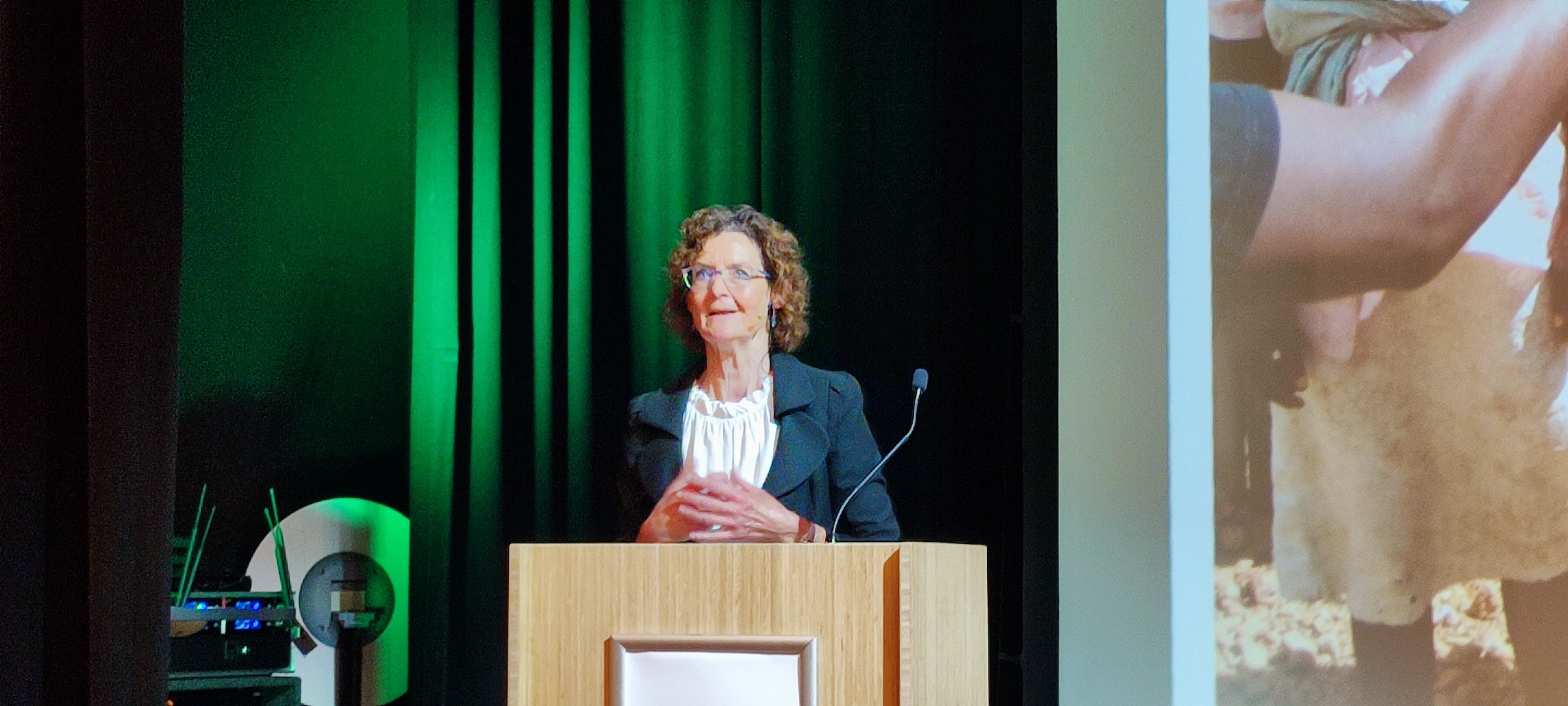In her keynote speech during the opening plenary session of the the IOS Fair Transitions - LANDac Conference & Summit: Land governance and the politics of fair transitions: Deepening the search for social justice on 3 July, 2024, Professor Frances Cleaver, Chair in Political Ecology at Lancaster University, argues that in aiming to deepen social justice in green transformations, we should pay renewed attention to the institutions of collective action at a very local level, especially peasant associations, irrigation groups, women's groups, indigenous people’s groups, producer associations, and the local committees that manage land, water, and forests.
I would like to make an argument that in aiming to deepen social justice in green transformations, we should pay renewed attention to the institutions of collective action at a very local level. I'm talking about peasant associations, irrigation groups, women's groups, indigenous people’s groups, producer associations, the local committees that manage land, water, forests. These are the institutions through which people claim resources, make collective action arrangements, make sense of their lives and their relationship to each other in the environment. They are potentially channels for enacting progressive change, for claiming rights, rights; for sharing and caring for resources, for amplifying the voices of particular groups. But we also know that such institutions can reinforce the power of elite actors and they can work to exclude and marginalize. Often the progressive workings of institutions happen as those which oppress or exclude.
What I want to raise here is the possibility of deliberately tweaking, nudging, reshaping such institutions in more progressive directions. I’ll do this by highlighting some points drawn from research on ‘facilitated bricolage’ , which raises a number of questions about how we might move forward with this kind of project. I'm talking about institutions here in their organizational form as associations and groups of people with constitutions. The picture here shows the constitution of a water committee in Zimbabwe in which people have compiled a set ofrules and roles and regulations for managing water. But we shouldn’t forget that institutions can also be seen as sets of values and beliefs, encompassing worldviews and ways of ordering and understanding the world.
In my work on institutions, I study them as emerging and functioning through processes of institutional bricolage. This happens when people piece together arrangements for collective action from the social and cultural resources available in their environment. So, in this example from Zimbabwe people draw on a prototype constitution offered by an NGO, but they also draw on customary leadership and decision making arrangements, they adapt the rules to reflect accepted social orders and ways of doing things ( like saving money) in the village. This piecing together of elements to make institutions that work in particular places is what I call institutional ‘bricolage’. It produces practical hybrid arrangements that work in particular contexts to allow people to organize, to manage resources, to distribute water or land or regulate their forests and so on. These piecemeal institutions are often shaped by what has gone before, for example, by the elders in the position of chair, or customary ways of organising collective action, meetings fo the people, speaking and conflict resolution. And whilst this social embeddedness is helpful in ensuring that the institutional arrangement works, and is generally accepted , it can also reproduce or reinforce social injustices. For example institutions formed this way may reinforce patriarchal forms of decision making, or prejudicial treatment of poor people or minority groups within a community. So is it possible to deliberately adjust the ways that these institutions work by creating the social fit but to ensure that they work in ways that are more socially just? This is where the idea of facilitated bricolage comes in.
There are four points I would like to raise about facilitated bricolage, the possibilities and challenges.
One, we know that local institutions work best when they can make connections, can connect to other actors in the plural governance landscape. Faciltiated bricolage starts with understanding where these community level institutions exists in the broader governance landscape. What are the key features of this and what is realistically possible at the community level ? Is the government centralised or decentralised ? What are the powerful branches of government at the district level that institutional forms do they favour and promote? Where can people in communities best make connections, lobby for rights and resources? Which state representatives are likely to act as channels or entry points for them or to advance their claims and support their actions?
The second point is to focus on key ‘bricoleurs’ in institutions – the people who play a major role in shaping the ways that the institution functions and who potentially can be agents for change. These are often people with plenty of human and social capital - cultural leaders, retired professionals, or people who jobs in the city as well as living in the village. They are important because they are often ‘boundary spanners’ – familiar with different domains of action, able to broker links beyond the institution, and to bring different forms of knowledge and experience into the functioning of the institution. Do institutions depend on these individuals, and how do you bring that boundary spanning, mediating role?
Related to this is the importance of ‘interface bureaucrats’ – the officers of government or development agents who work directly with communities and may be in a position to help to shape community institutions in certain ways. Why are these interface bureaucrats important? Because they're often the ones who are responsible for enforcing government policy, but they also enter into informal agreements with communities. For example, environmental officers may negotiate by-laws with communities, hybrids of formal and informal ways of doing this, that are a negotiated compromise between legislation and community practices. These interface bureaucrats can also act as gatekeepers or as champions. They can enforce or they can turn a blind eye to the way that people in communities follow or don't follow government regulations and so on. They have knowledge of how the state works, and where there are likely resources, opportunities for action and so on. A question arises – is it possible to support ‘interface bureaucrats’ – to encourage flexibility and creative problem solving with communities, to enhance their ability to champion social justice considerations as they navigate the terrain between community institutions and government bureaucracies. ?
The third element I'd like to talk about is that effective institutions are formed through constant adaptation and adjustment. How is it possible to encourage and support and enhance processes of creative experimentation, of iterative problem solving. Can we support people in thinking about the institution, not as something that's written in the constitution, but as something where people negotiate, rethink the rules and regulations, and rethink how they work to include or exclude. For example, in this picture , women at the waterpoint are actually re-negotiating the tariff set in the constitution – raising a discussion about the poorest being disadvantaged and suggesting fairer ways of securing contributions from them. Deliberately enhancing the supporting people in reflecting, challenging, adjusting and remaking institutional arrangements could be one way of nudging institutions towards social justice.
The fourth area of facilitating bricolage that I think is probably the most difficult to encounter is questioning the worldviews that are embedded in institutions. Institutions often incorporate incorporate worldviews or ‘moral ecological frameworks’ . These concern the proper relationship of humans with ‘more than humans’ ( the natural and supernatural worlds), about ideal social and natural orders about fair distributions and values. These moral ecological framings ensure the fit of the institution with local values and traditions but they can also serve to ‘discipline’ – to reinforce social orders and ‘the right way of doing things’. In the example here from Zimbabwe the moral ecological order emphasises respect for elders and for socially conservative ways of being and acting. In this community elders linked drought to the lack of respectful behaviour and promiscuity in young people. If we are interested in promoting social justice , it is important to bring moral ecological understandings or worldviews into scrutiny, not just assuming that they're good because they're traditional or, or because they embody close relationships with the environment. Assumptions about the proper social order that that underlies this moral ecological rationality is a very difficult thing to bring into question. This is where using creative methods derived from the arts , such as theatre and storytelling might help. Through these creative approaches people may be able to explore and question the exclusionary or disciplinary aspects of worldviews, and to think through how to adapt these.
There are a number of challenges related to faciltated bricolage , and I'll just touch on them. The biggest challenge is who's going to do the facilitation - is it us as researchers or people working in NGOs or activist organizations telling people in communities that they need to change their institutions, that their institutions are not socially just?
Then, how do we get people in community institutions to be interested in the work of scrutinising their institution and changing it? That involves time and effort and commitment.
And of course institutions are constantly shifting and changing. Sometimes in unanticipated ways, and to some extent they defy design. If you want to do this facilitated ‘bricolage’ for more social justice, it's an ongoing project. It's a recognition that it's not going to end at some point.
My final point is that in order to increase the functioning of collective action institutions at the local level in a more socially and environmentally just way , we need to engage in forms of facilitated ‘bricolage’ that are somewhere between advocacy, critique, and creative experimentation. I'm going to challenge those of you who work with collective action to share any experiences you have of how to do that.


